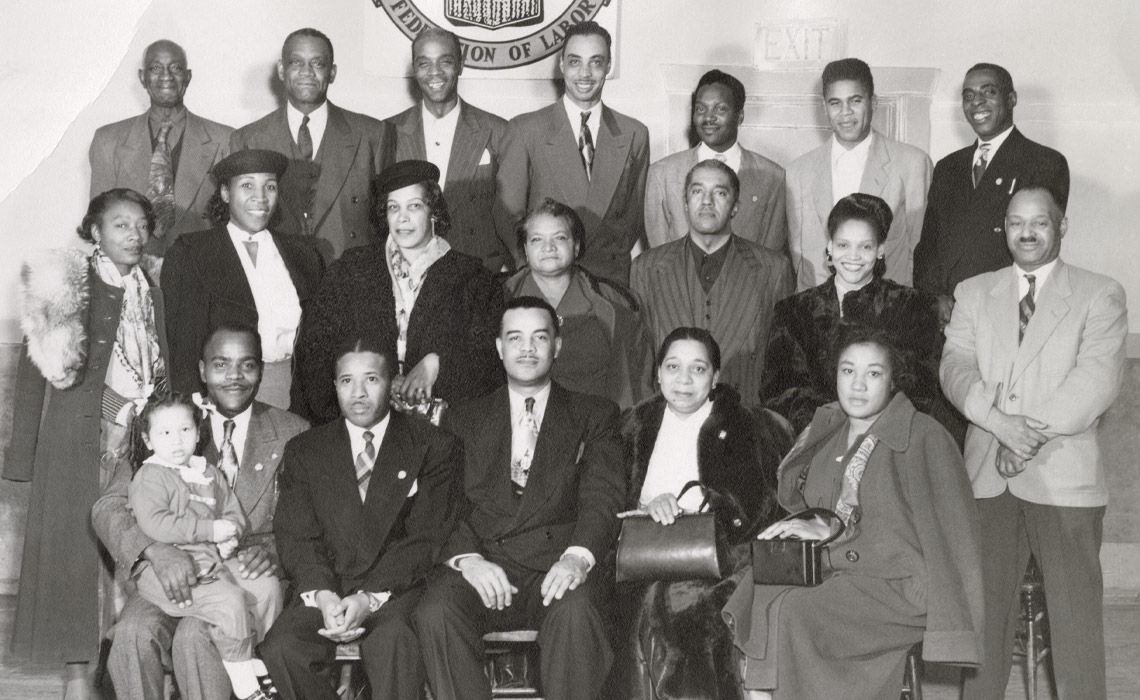Collective activism in action

They were an integral part of rail travel in the first half of the 20th century, yet they moved through their tasks with little or no recognition of their workload, how they were treated or who they were as individuals.
They were called sleeping car porters. Almost all were Black men, many Canadian-born among their number, but others recruited to work from the United States and the West Indies. There were about 30 porters who made their homes in Calgary.
Although they are no longer a part of today’s travel, they have been brought into the spotlight through works such as the 2023 Giller Prize-winning novel by Calgarian Suzette Mayr, The Sleeping Car Porter, which tells the story of one man’s experience in the role.
On March 7, Mayr, along with historians Sage Mathieu and Cheryl Foggo (a 2023 MRU Honorary Doctor of Laws recipient), will share the stage at Calgary’s Grand Theatre for a special, free event, Remembering Alberta’s Sleeping Car Porters. Mount Royal is one of the main sponsors of this event, alongside the Canadian Committee on Labour History, the Calgary District Labour Council, and the Grand Theatre. MRU students have worked as research assistants in organizing archival material about Calgary Porters in support of the event and in designing all promotional materials.
'My name is not George'
“Porters were a bit like a combination of flight attendants, butlers and hotel staff rolled into one," explains Dr. Kirk Niergarth, PhD, associate professor of history in the MRU’s Department of Humanities.
The porters, Niergarth explains, were the point of contact for and at the service of passengers, often wealthy and elite, as they rode the rails in Canada — whether they were on the nation-wide lines (the CPR and the CNR) or regional rails, as in Alberta, the Northern Alberta Railway.
“Because of racism in Canadian society generally, the job of the porter was one of the few occupational avenues open to Black men,” Niergarth continues. “Because of the racist provision in the contracts of other railway unions, it was virtually impossible for porters to be promoted to more highly paid positions on the rails, such as conductors.”
Highly reliant on tips, porters needed to maintain a sunny disposition regardless of their fatigue or the behaviour of passengers who often called all porters by the condescending nickname “George”. The fact that Stanley Grizzle, a leading porter unionist and historian, called his memoir My Name’s Not George gives some sense of how porters felt about that nickname.
Niergarth says one of the major challenges of their job was sleep deprivation — on a 72-hour trip, they might get three hours of sleep, which until they unionized, was on a bench in the smoking room. Porters were almost always on call and had to make sure that all passengers disembarked at the correct stop, day or night.
Unionizing the sleeping car porters
With poor working conditions and the lack of upward mobility as major issues, the porters began to mobilize to form unions to fight for better rights. The first in Canada, the Order of Sleeping Car Porters was organized by CN porters shortly after the First World War. By the late 1930s, the American union, the Brotherhood of Sleeping Car Porters (BSCP), responded to requests from Canadian CPR porters to help begin organizing north of the border.
The BSCP formed divisions in cities across the country, and Calgary porters voted to join in October of 1943, forcing the Canadian Pacific Railway to the bargaining table. The first contract between that railway and the porters was negotiated in 1945.
“Porters and their families mobilized for change on two interconnected fronts,” Niergarth explains. “On the employment front, they organized to bargain collectively and to improve their wages and working conditions. More broadly, they organized to strengthen the bonds within their community and to combat racial discrimination and to obtain equal treatment within the broader society of which it was a part.”
Job security and increased income for porters had a significant impact on the black community in Calgary, leading to home ownership, supporting black-owned businesses, and allowing the next generation to pursue higher levels of education.
By 1948 the BSCP became dues-paying members of the Calgary Labour Council and this organization, too, began to advocate publicly for racial equality. It formed a standing committee on racial discrimination in 1952, which called out “... the matter of discrimination against any person because of their race, color or creed (as) not in the best interests of the people of the Province of Alberta.”
“It is entirely fitting that the Calgary District Labour Council is one of the sponsors of the 7 March event at the Grand Theatre, Remembering Alberta’s Sleeping Car Porters,” Niergarth says.
“But more broadly, I think the legacy of the porters is to give us some indication of how people can organize to make change. Their collective action improved their economic lot in life, certainly, but their organization was also about building community, about mutual support, and about treating each other with dignity and respect and expecting to be likewise treated by others.”
Voices of the sleeping car porters
In the 1980s, Stanley Grizzle interviewed porters across the country to capture their history. Library and Archives Canada has digitized these interviews and made some of them available online. Professor Niergarth has excerpted a few clips from Calgary porters:
Hear longtime Calgary porter Melvin Crump describe a typical shift in an interview clip.
J.R. King was a Calgary porter who served on the Grievance Committee. His daughter, Violet, became the first Black woman lawyer in Canada. His son,Ted, also worked as a porter before owning his own accounting and realty businesses. Ted was also president of the AAACP. You can hear him talking about his family.
Roy Williams, a Calgary porter who was instrumental in forming the local union, describes how he felt about the porters’ reliance on tips before unionization in an interview clip.

